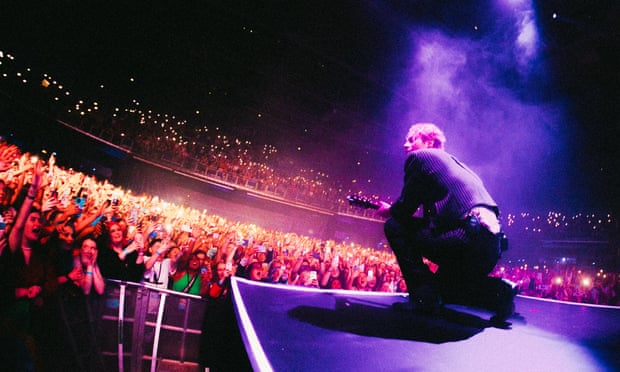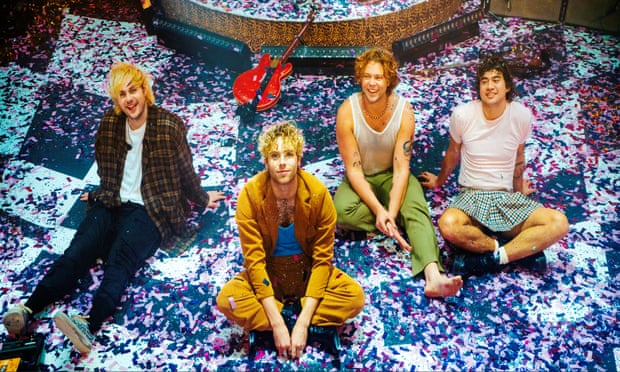5 Seconds of Summer are learning how to be happy: ‘There’s parts of our career that I don’t remember’ | Music
ESeven years ago, four Australian schoolboys were spotted covering Bruno Mars and Justin Bieber songs on YouTube, plucked from obscurity and planted on some of the world’s biggest stages, 5 Seconds of Summer are beginning anew. A few months before they’ll play two sold-out homecoming shows in the forecourt of the Sydney Opera House, they’re celebrating the release of 5SOS5, their (appropriately titled) fifth studio record – and their first independent release. You take control, in more ways than one.
But first, Luke Hemmings (vocals/guitar), Ashton Irwin (vocals/drums), Michael Clifford (vocals/guitar) and Calum Hood (vocals/bass) face another monumental creative task: an album release show at the London Royal Albert Hall. It is not only a venue of global importance, but also of personal importance: in their founding years they once frequented the concert hall on a trip to London. This time they will be indoors and accompanied by an orchestra.
“I think when [the shows] I’m going to be very stressed and trying to enjoy it and not just focus on how stressed I am,” Hemmings says while seated with Irwin in a studio in Eagle Rock, California. “I want to enjoy it and be able to fully remember it because there are parts of our career that I don’t remember just because of the sheer volume and because I wasn’t there.”
To fully understand the band’s meteoric rise over the past 11 years would be an incredible achievement for anyone, let alone a teenager. Barely a year after 5SOS’ first show in 2011 in front of a dozen people at Sydney’s Annandale Hotel, they embarked on a nearly 100-day world tour as a support act for One Direction. By then they were playing four nights in front of more than 80,000 people at the Allphones Arena in Sydney.
Back when the popularity of boy bands like One Direction and BTS soared to levels threatening the sound barrier, 5SOS took a different tack. They had a fresh, dynamic quality and drew on the pop punk they grew up listening to. All four were born in the shadow of Green Day’s 1994 breakthrough Dookie (Irwin, now 28, is the oldest member of 5SOS), and they’ve repackaged this chart-topping punk for a new generation. Within a few years, 5SOS became the only band in history to have each of their first three studio albums hit No. 1 on the Billboard 200.
Since then, they’ve racked up five Aria awards at home, plenty of hardware abroad, and outlasted the band that gave them that early lead (One Direction has been on hiatus since 2015). Her 2018 song Youngblood became Australia’s best-selling single that year, then the country’s eleventh best-selling single of all time, ranking at number 5SOS below AC/DC, Vance Joy and Kid Laroi. They have sold more than 12 million albums worldwide.
As one of the most successful musical acts in Australian history, it would have been easy for 5SOS to just stick with what worked. They had perfected a formula and were enjoying the loot. But when pop shifted to something similarly emo-influenced – the likes of Olivia Rodrigo and Machine Gun Kelly were credited with “saving” pop-punk – 5SOS stepped back and switched gears.
How does it look for this band to be on hiatus in a way they haven’t in a decade?
“You suddenly stop and realize…um, I’m sick now and I want to move all the time no matter what,” Irwin says. “And I don’t know how Not Movement.”

The pace of life on the streets is manifested in physical and mental illness. In June, Irwin was hospitalized for extreme heat exhaustion during a show in Texas. He has been sober since 2019 and has experienced body dysmorphia – something he wrote about in his song Skinny Skinny off his debut solo album. Spending a decade under the glare of cameras and fame also contributes to her own brand of spiritual illness.
The pandemic was a “forced stop” for the whole band that created a liberating kind of freedom. They moved to Joshua Tree to think and write together, without the same promotion and touring cycle they associate with making music. When a producer’s planned visit to his makeshift studio was spoiled by a flat tire, Clifford took over and led the sonic direction for 5SOS5, producing much of the record himself.
“We’ve had a little more time to think about everything that’s happened to us compared to the years before where we just wrote an album, went on tour, wrote an album, went on tour,” says Irwin . “It was kind of an endless loop.”
They reflected on how their rapid rise, says Irwin, “affected us personally, spiritually, physically, and philosophically. So we just dived into that feeling and rode it into the sunset.”
In one of the new album’s early singles, Me, Myself and I, Hemmings sings about being a pit of need; gets what he wants but still doesn’t feel satisfied. “Many [the new album] is about romantic relationships and friendships,” he says. “But it’s more about realizing that you might not have that many emotional tools in your tool belt to figure out why they’re affecting you.”

With just a few albums into their career, the brash upstarts from Sydney were barely past their 20s when they began experiencing the downside of their overnight success. On More they sang about “a house full of everything we wanted/but it’s an empty home”. “A band is often a traumatic bond because you’ve been through so much together,” Irwin told NME in 2020.
Just a few years earlier, a Rolling Stone cover story painted 5SOS as dissolute kids making the most of a good cause: partying hard and burning bright, but destined to be wiped out. The people in this story couldn’t be more different than those who stand before me now. Hemmings seems keen to question the emotional roots of his songwriting; like Irwin, he released a solo record last year. And Irwin explores creativity of all kinds, as openly as countless newcomers to LA before him. They’re still young adults — but adults nonetheless, grappling with what it means to be “on the other side of 24,” seeing scenes change and people slipping out of sight.
In the press bio for the new album, Irwin talks about how he and his bandmates consciously and actively chose to show up to be in the band for another day. Nothing about the band or their new album or where they end up is shown by default.
“When we decided to write together [in 2020], we had begun to heal ourselves from moving so much and at such a fast pace,” says Irwin. “And that, in turn, began to heal our creative relationship.”
“Healthy” is a word that comes up a lot in our conversation; Hemmings and Irwin talk about having healthy goals and patterns, making sure their health is a priority, and living their own lives outside of the band — “in a healthy way,” Hemmings clarifies. Getting out of each other’s pockets allowed them to find a new way forward together.
“It’s almost like we’re going back to the basics of the band,” says Hemmings. And after an era of feeling heavy and down, he says that these days “we’re trying to bring that light across.”